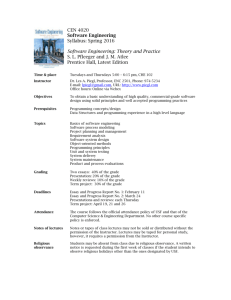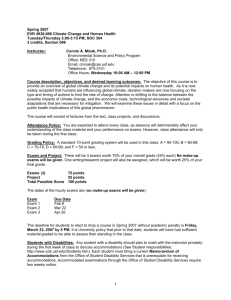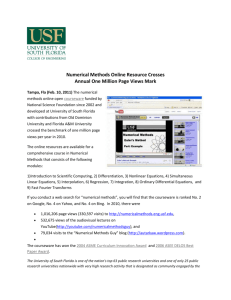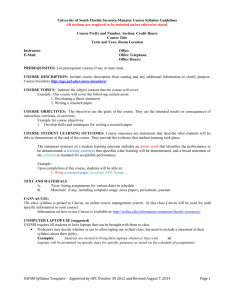College of Public Health University of South Florida Department of
advertisement
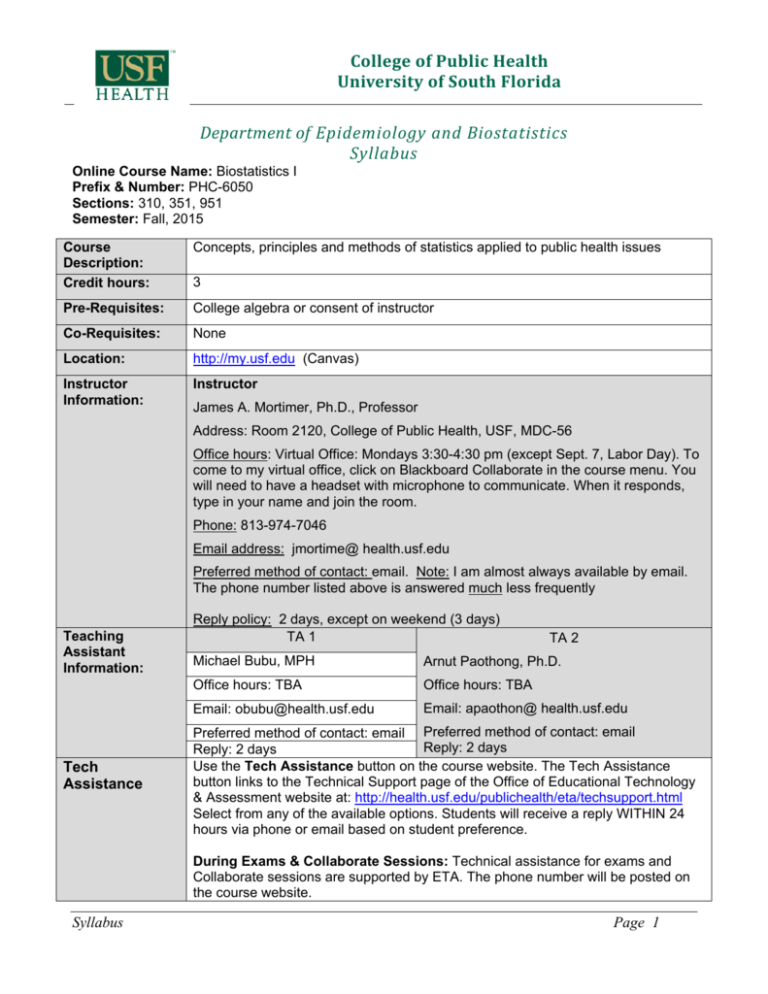
College of Public Health University of South Florida Department of Epidemiology and Biostatistics Syllabus Online Course Name: Biostatistics I Prefix & Number: PHC-6050 Sections: 310, 351, 951 Semester: Fall, 2015 Course Description: Credit hours: Concepts, principles and methods of statistics applied to public health issues Pre-Requisites: College algebra or consent of instructor Co-Requisites: None Location: http://my.usf.edu (Canvas) Instructor Information: Instructor 3 James A. Mortimer, Ph.D., Professor Address: Room 2120, College of Public Health, USF, MDC-56 Office hours: Virtual Office: Mondays 3:30-4:30 pm (except Sept. 7, Labor Day). To come to my virtual office, click on Blackboard Collaborate in the course menu. You will need to have a headset with microphone to communicate. When it responds, type in your name and join the room. Phone: 813-974-7046 Email address: jmortime@ health.usf.edu Preferred method of contact: email. Note: I am almost always available by email. The phone number listed above is answered much less frequently Teaching Assistant Information: Tech Assistance Reply policy: 2 days, except on weekend (3 days) TA 1 TA 2 Michael Bubu, MPH Arnut Paothong, Ph.D. Office hours: TBA Office hours: TBA Email: obubu@health.usf.edu Email: apaothon@ health.usf.edu Preferred method of contact: email Preferred method of contact: email Reply: 2 days Reply: 2 days Use the Tech Assistance button on the course website. The Tech Assistance button links to the Technical Support page of the Office of Educational Technology & Assessment website at: http://health.usf.edu/publichealth/eta/techsupport.html Select from any of the available options. Students will receive a reply WITHIN 24 hours via phone or email based on student preference. During Exams & Collaborate Sessions: Technical assistance for exams and Collaborate sessions are supported by ETA. The phone number will be posted on the course website. Syllabus Page 1 College of Public Health University of South Florida Online Course Technical Requirements: Students in all online public health courses are expected to meet the basic technology requirements to successfully participate in their courses. Failure to meet these requirements may cause problems accessing the course materials. It is the student's responsibility to ensure all requirements are met prior to the start of the semester. http://health.usf.edu/publichealth/eta/students_tech_requirements.htm Special Technology Requirements for this course: Describe if applicable. Provide link and description of additional requirements here Pre-requisite technology skills: Describe any technology skills required before taking this course here. Collaborate Computer Requirements: (if applicable) View hardware and software requirements and downloads for Collaborate sessions: http://eta.health.usf.edu/technology/Collaborate/Collaborate_Instructions.pdf Respondus Lockdown Browser Student Guide: (if applicable) http://tiny.cc/gm4x6 Required Materials: Essentials of Biostatistics in Public Health, Second Edition, by Lisa M. Sullivan, Jones and Bartlett, 2012. SPSS Survival Manual, 5th edition by Julie Pallant, McGraw-Hill, 2013. Each student should have a handheld calculator. The calculator should be able to perform addition, subtraction, multiplication, division, squares, square roots, natural logs and exponentials. Calculations of xy are helpful. Each student also should have a licensed version of SPSS available to them for the homework and practice sessions. Software is available from the USF Computer Store, either on-campus or on-line. The software will cost $10. Textbooks available at HSC Bookstore http://usfhsc.bkstore.com. OR at Amazon.com Recommended Materials: Course Format: None. This course is a web-based course with narrated interactive presentations, videos, practice and feedback units and assigned homework. Students are encouraged to participate in the live, real-time interactive help sessions. The course is divided into weekly modules, which have several sections. I would suggest that you begin at the top and proceed through the bottom. This is the intended order. Course Timing: Course content will be posted at 12:01 am on the Tuesday each module begins and will remain posted through the end of the course. The course does not meet online except for the live help sessions, Syllabus Page 2 College of Public Health University of South Florida Help Sessions (participation is strongly encouraged): Live Interactive Group Help Sessions: • Dates and times: Tuesdays, 7:30 pm – 9 pm, beginning September 1. There will be no help sessions on September 29 and November 3, the Tuesdays after exams are given. Format: All help sessions are moderated by a Graduate Assistant. Students and the Graduate Assistant will meet virtually using USF’s audio-visual conferencing software (Blackboard Collaborate: Elluminate Live!). This format allows for live, interactive (two-way) real-time audio and (oneway) visual communication between the Graduate Assistant and all students in the help session. • What will be covered: The help sessions will review the homework for the previous week and questions will be addressed. After the help session, the homework answers will be posted at Modules > Accessing the RECORDED Elluminate Live! Help Sessions. • Replay of Help Sessions: All help sessions will be recorded and be available for replay as streaming video the following day. Recorded help sessions can be accessed at Modules > Accessing the RECORDED Elluminate Live! Help Sessions • Technology Requirements: Students will need a microphone and audio capabilities to communicate verbally. See technology requirements for additional software and hardware specifications. Individual help (optional): Students are strongly encouraged to use the group help sessions and/or the Discussion Board to obtain clarification on course content. Individual help with content needs to be arranged with the TAs for the course listed on the first page of the syllabus. Syllabus Page 3 College of Public Health University of South Florida Learning Objectives: (Objectives must be numbered) 1. Understand the history and evolution of the field of modern biostatistics. 2. Understand that the main concept of biostatistics is the use of samples to estimate population parameters 3. Distinguish and understand the differences between nominal, ordinal, and continuous variables. 4. Understand the ways to data can be described for each variable type. 5. Understand the way in which basic concepts of probability and random variation are related to descriptive and inferential methods utilized by biostatistics. 6. Describe the normal distribution, how it is generated and why it has wide applicability to inferential techniques. 7. Describe how the Poisson distribution is generated and what it represents. 8. Describe how the binomial distribution is generated and what it represents. 9. Understand the concepts of a sampling distribution, type I and II errors, and statatistical power. 10. Understand and be able to apply specific descriptive and inferential techniques commonly used in public health research including: tables; graphs; statistical measures of central tendency, variability, relative position and distributional shape; risk and odds ratios; confidence intervals; Z-tests; t-tests; one sample tests for a proportion; McNemar’s test; analysis of variance; multiple comparison procedures; Pearson product-moment correlation; Chi square; simple linear regression; common non-parametric and permutation methods; and methods to compute statistical power. 11. Be familiar with sensitivity, specificity, positive and negative predictive values. 12. Given a research question, be able to select and apply appropriate basic descriptive and inferential techniques to address that issue. 13. Be able to read statistically-oriented public health research articles with better understanding. Syllabus Page 4 College of Public Health University of South Florida Assessment Strategies: (Strategies must be numbered) . 1. Self-assessments (ungraded) are provided as part of the modules, permitting students to assess their own abilities and address deficiencies through additional reading and practice. 2. Weekly homework assignments will be graded. 3. Three on-line exams, each covering a specific one-third of the course material, will be given and used to help grade students on their achievement of the learning objectives. Syllabus Page 5 College of Public Health University of South Florida This course meets the following MPH Core Competencies. Learning Objectives Competency Assessment Strategies 1. Describe the roles biostatistics serves in the discipline of public health. 1,13 1,2,3 2. Describe basic concepts of probability, random variation and commonly used statistical probability distributions. 2,5,6,7,8,9 1,2,3 3. Describe preferred methodological alternatives to commonly used statistical methods when assumptions are not met. 10 1,2,3 4. Distinguish among the different measurement scales and the implications for selection of statistical methods to be used based on these distinctions. 3,4 1,2,3 5. Apply descriptive techniques commonly used to summarize public health data. 4,10 1,2,3 6. Apply common statistical methods for inference. 10 1,2,3 7. Apply descriptive and inferential methodologies according to the type of study design for answering a particular research question. 12 1,2,3 13 1,2,3 13 1,2,3 8. Apply basic informatics techniques with vital statistics and public health records in the description of public health characteristics and in public health research and evaluation. 9. Interpret results of statistical analyses found in public health studies. Syllabus Page 6 College of Public Health University of South Florida Grading Scale and Criteria: Grading Events: On-line Exams: All examinations are to be solely the work of the student. No assistance is allowed. Use of any assistance on completing the examinations is considered disruption of the academic process and violation of the policy regarding academic integrity and will be treated accordingly. Assistance includes but is not limited to notes, books, computer resources and persons. Examination Procedures: All exams are “closed book.” No exam “retakes” will be given. Each exam will focus on the material given in the units in the preceding segment of the course – see Course Calendar. However, the concepts learned to date in the course will be needed to successfully take all exams. There will be no final exam covering the entire course. Each of three exams will be available for students to begin anytime between 8:30 am and 9:00 pm (Eastern Time) on the days indicated in the Course Calendar below. Students will have one and a half hours from the time of access to complete the exam. As soon as you begin (open the exam) CANVAS will begin timing you. You are required to complete the exam and close it within one and a half hours from the time it is opened. Exams will consist of 25 multiple-choice questions. It is recognized that some students may occasionally experience conflicts with other courses or job-related duties regarding the timing of the exams. If you anticipate difficulty taking any exam at the assigned time, please email the instructor as soon as possible to arrange for an alternative time to take the exams. Requests made after the exam is scheduled to begin will not be considered. Make-up Exam: Make-up exams are only given due to extreme circumstances or emergencies. Students are required to provide appropriate documentation, which will be determined acceptable by the instructor, BEFORE being allowed to take any make-up exam. Homework: Each week a homework assignment must be submitted no later than Sunday night at 11:59 pm. The homework assignments will Syllabus Page 7 College of Public Health University of South Florida be given a grade of 0 to 100. There will be a total of 12 homework assignments. Grading Policies: The three exams will count as 60% of the grade (20% for each exam). Assigned homework will be graded weekly and will have a maximum score of 100 each week. Homework grades will be averaged over the course and this grade will count as 40% of the final grade. The instructor reserves the right to add a fixed number of points to all students’ scores on any exam to assure an appropriate distribution of scores. Grading Scale: A B C D F 90-100 80-89 70-79 60-69 <60 The letter grade will be determined from the final numeric grade and the table above. Numeric grades of 59.5, 69.5, 79.5 and 89.5 will be rounded up, before assigning the letter grade. COURSE POLICIES Online Attendance & Participation: Permission to Use Lectures: Instructor Expectations: Syllabus Students are expected to read and review all course materials in a timely manner. Viewing of posted learning units and other materials may be monitored by the instructor through automatic registration viewing events throughout the term. In the event of an emergency, it may be necessary for USF to suspend normal operations. During this time, USF may opt to continue delivery of instruction through methods that include but are not limited to: CANVAS, Elluminate, Skype, and email messaging and/or an alternate schedule. It’s the responsibility of the student to monitor the CANVAS site for course specific communication, and the main USF, College, and department websites, emails, and MoBull messages for important general information. All unauthorized recordings of class are prohibited. Recordings that accommodate individual student needs must be approved in advance and may be used for personal use during the semester only; redistribution is prohibited. Materials used in this course are the property of the University of South Florida and the instructor. Students are not permitted to sell notes, tapes, outlines, syllabi or any other material used in this course without written permission. Students are expected to have read this syllabus carefully. They will be Page 8 College of Public Health University of South Florida Incomplete Policy: Schedule Change Policy: responsible for completing all course requirements in an appropriate and timely manner and for submitting homework and taking the examinations on the indicated dates without additional reminders. Failure to take an exam on the indicated date or on another date agreed to before the exam is scheduled will result in a numeric grade of zero for that exam, which will be averaged with other two grades to determine the final numeric grade. Incomplete grades will be given to students with extenuating circumstances (sickness, absence beyond their control) with appropriate documentation. Such grades must be requested prior to taking the third exam in the course. Applicable COPH and graduate school policies and procedures will be followed. COPH policy: http://publichealth.usf.edu/academicaffairs/academic_procedures.html Any changes to the course calendar or other modifications in the course will be announced in advance and a revised syllabus will be provided. Course Calendar Date August 25-August 31 Module 1 Sept. 1-Sept. 7 Module 2 Sept. 8-Sept. 14 Module 3 Sept. 15-Sept. 21 Module 4 September 24 Examination 1 – covers Modules 1-4 -- begin between 8:30 am and 9:00 pm Sept. 29-October 5 Module 5 October 6-October 12 Module 6 October 13-October 19 Module 7 October 20-October 26 Module 8 October 29 Examination 2 -- covers Modules 5-8 – begin between 8:30 am and 9:00 pm Nov. 3-Nov. 9 Module 9 Nov. 10-Nov. 16 Module 10 Syllabus Page 9 College of Public Health University of South Florida Nov. 17-Nov. 24 Module 11 Nov.24-Nov. 30 Module 12 December 10 Examination 3 -- covers Modules 9-12 – begin between 8:30 am and 9:00 pm Additional Course Information Course Evaluations: An announcement will be made on the course website regarding the way to access them when they become available towards the end of the course. Course Communication: Announcements will be posted on the course website for changes to the course or to communicate issues from the instructor, graduate teaching assistant or ETA office. Please monitor the Announcements regularly. Who To Contact and How: There are several people who work together to support students who participate in COPH distance learning courses. Please try to adhere to the following recommendations when requesting support: • For course content related questions, which are not confidential, use the assigned help session. • For problems accessing the course materials (narrated presentation, course links, streaming video, help sessions) use the “Tech Assistance” button located on the course Home page. For more immediate responses, contact The Office of Educational Technology and Assessment (ETA) at 813-974-6666 or via email at eta@health.usf.edu. Please be specific, indicating the exact problem, your computer specifications, the name of the video/presentation and your course number! For computer related technological support & Canvas problems (i.e., computer questions, access to Canvas, USF email, USF portal, NetID, cannot access the course, browser issues), please contact Academic Computing helpline at (813) 974-1222 or help@acomp.usf.edu INSTITUTIONAL POLICIES & STUDENT RESOURCES Go to: Institutional Policies information & Student Resources or http://tinyurl.com/usfpolicies Syllabus Page 10

